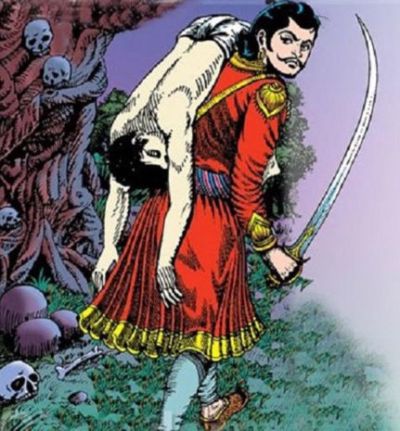King Candrāvaloka beheld the boy who stood before him, his courageous demeanor, and the tej (glow) on his face, and he was delighted.
He ordered for the boy to be clothed in fine garments, with garlands of flowers with the sweetest of smells, and had him sit on an elephant, and with his parents, took him to the place where he had seen Jvālāmukha.

आविर्बभूव मुक्ताट्टहासः सो ऽध्ययनं पठन् ।
घूर्णन् रक्तासवक्षीबो जृम्भमाणो मुहुः श्वसन् ॥ १२,२७.११५ ॥
ज्वलन्नेत्रो दिशः कुर्वन् देहच्छायान्धकारिताः ।
ज्वालामुखो महारौद्रदर्शनो ब्रह्मराक्षसः ॥ १२,२७.११६ ॥
ततश् चन्द्रावलोकस् तं दृष्ट्वा प्रह्वो ऽब्रवीन् नृपः ।
नरोपहारो भगवन्न् आनीतः स मया तव ॥ १२,२७.११७ ॥
सप्तमो दिवसश् चाद्य प्रतिज्ञातस्य सो ऽस्य ते ।
तत् प्रसीद गृहाणैतम् उपहारं यथाविधि ॥ १२,२७.११८ ॥
The pujari drew a circle near the aśvattha tree, and started to chant mantras, while performing a yagna to appease the rākshasa.
Soon enough, Jvālāmukha appeared, laughing loudly. He was a terrible sight and was drunk on blood…his eyes blazed, his breath was short and hurried, and the whole place was overshadowed by his presence.
KIng Candrāvaloka bowed before the fierce-looking rākshasa, and said…
“Oh revered being! I have brought you this boy as sacrifice, and today is the seventh day. Please accept my humble offering to you.”
इति राञ्जार्थितो विप्रकुमारं ब्रह्मराक्षसः ।
स तम् आलोकयामास जिह्वया सृक्किणी लिहन् ॥ १२,२७.११९ ॥
तत् क्षणं स महासत्त्वो बालो हृष्यन्न् अचिन्तयत् ।
स्वदेहदानेनानेन सुकृतं यन् मयार्जितम् ॥ १२,२७.१२० ॥
तेन मा भून् मम स्वर्गो मोक्षो वा निरुपक्रियः ।
भूयात् तु मे परार्थाय देहो जन्मनि जन्मनि ॥ १२,२७.१२१ ॥
इति संकल्पयत्य् एव तस्मिन्न् आपूर्यत क्षणात् ।
विमानैः सुरसंघानां पुष्पवृष्टिमुचां नभः ॥ १२,२७.१२२ ॥
अथाग्रे प्रापितं तस्य बालं तं ब्रह्मरक्षसः ।
माता जग्राह करयोः पिता चरणयोस् तथा ॥ १२,२७.१२३ ॥
ततो यावत् तम् आकृष्टखड्गो राजा जिघांसति ।
तावज् जहास स शिशुस् तथा सर्वे ऽत्र ते यथा ॥ १२,२७.१२४ ॥
सब्रह्मराक्षसास् त्यक्त्वा स्वं स्वं कर्म सविस्मयाः ।
रचिताञ्जलयः प्रह्वास् तन्मुखप्रेक्षिणो ऽभवन् ॥ १२,२७.१२५ ॥
When the king spoke thus, Jvālāmukha looked at the young boy, and licked the corners of his mouth, anticipating a tasty meal.
At that very moment, the boy thought to himself…
“Let not the merit that I acquire after the sacrifice of my material body come to me – I don’t want svargā, nor mokshā…instead, may I be privileged to offer my body for the benefit of others, in every janma, in every birth that I take!”
As he was thinking this, the skies were filled with the chariots of the devās, who showed flowers upon him.
The boy was then placed in front of Jvālāmukha, his mother held his hands and his father held his feet, and the king drew his sword to slay him.
At that moment the boy laughed out loudly. so loudly that everyone present, Jvālāmukha included, stopped doing what they were doing, and instead in their astonishment, joined their palms together and bowed to him.
इति व्याख्याय वेतालो विचित्रसरसां कथाम् ।
तं त्रिविक्रमसेनं स निजगाद नृपं पुनः ॥ १२,२७.१२६ ॥
तद् ब्रूहि राजन् को हेतुर् यत् तेन हसितं तदा ।
बालेनैतादृशे ऽप्य् अस्मिन् प्राणान्तसमये ऽप्य् अहो ॥ १२,२७.१२७ ॥
कौतुकं च महन् मे ऽत्र तद् एतच् चेन् न वक्ष्यसि ।
जानानो ऽपि ततो मूर्धा शतधा ते स्फुटिष्यति ॥ १२,२७.१२८ ॥
The Vetāla finished his story, and then addressed King Vikram and said…
“So tell me, o King, why did the boy laugh when his death was imminent?”
“Remember, if you know the answer, and don’t tell me the truth, your head will burst into a hundred pieces!“
King Vikram replied…
to be continued…
